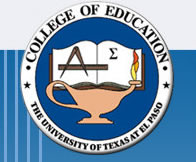
Bill Robertson, Ph.D. - Classes
Teacher Education Department
SCED 3311 - Curriculum Planning in Secondary Schools - Syllabus
Instructor: Dr. Bill Robertson
Phone: 747-8608
Office: Education Building, Room 606
Email: robertson@utep.edu
Class Web Site: http://utminers.utep.edu/robertson/classes/sced3311/default.htm
Office hours: Monday 3:30 – 5:00 PM, Tuesday 10:30 AM – 12:00 PM
Texts
Brooks, J. G., & Brooks, M. G. (1999). In Search Of Understanding: The Case For Constructivist Classrooms. Alexandria, VA: ASCD.
McTighe, J., & Wiggins, G. (1998). The Understanding By Design Handbook. Alexandria, VA: ASCD.
Robertson, William H. (2008). Developing Problem-Based Curriculum: Unlocking Student Success Utilizing Critical Thinking and Inquiry, Kendall Hunt Publishing, Des Moines, Iowa
Course Description
This course is designed for the prospective secondary teacher and it is based on the conceptual framework of the College of Education. You will be asked to locate yourselves within the educational context of teaching and learning. We will examine the possibilities that exist within educational reform and the implications for teachers and students who want to teach in a secondary school setting. You will have the opportunity to begin a process of reflection and growth that will help create meaningful learning experiences for you and your students. Also, you will make connections between curriculum theory and practice.
Goals
We will address factors that support meaningful growth and progress intended to guide you on an inner journey towards personal transformation. Our classroom community will develop a process that will allow us to explore "who we are, what assumptions we hold as true, how and what we teach, how we organize ourselves, and what barriers prevent us from creating authentic learning environments" (Crowell, Caine & Caine, 1998).
The block I and II courses are presented to you as an integrated whole with many overlaps within and between semesters. It is expected that you participate, reflect and process your encounters and that you begin to accept, reject and modify beliefs that will guide your teaching practice.
Meeting Times
Classes will be on Tuesdays from 1:30 to 4:20 PM during the spring 2009 semester. Homework will be assigned regularly. The class will be a combination of lecture, guided instruction, classroom discussion, classroom exercises, and project development. Every class meeting is vital. It is the students’ responsibility to meet with the professor to arrange an alternative for any class session missed. Cell phones and other forms of electronic communication should be turned off during class meetings.
TExES Standards
Class activities and assignments use the best practice methods that support the competencies from the TExES Standards. Discussions will focus on how the lesson/ activity/ assignment addresses the competencies that support best practice while also providing pre-service teachers insight into questions that may appear on TExES. This resource is available at the following URL: (http://www.sbec.state.tx.us/SBECOnline/standtest/texes/8-12ppr.pdf).
TExES Secondary and All Levels Professional Development Standards
- Standard I: The teacher designs instruction appropriate for all students that reflects an understanding of relevant content and is based on continuous and appropriate assessment.
- Standard II. The teacher creates a classroom environment of respect and rapport that fosters a positive climate for learning, equity, and excellence.
- Standard III. The teacher promotes student learning by providing responsive instruction that makes use of effective communication techniques, instructional strategies that actively engage students in the learning process, and timely, high-quality feedback.
- Standard IV. The teacher fulfills professional roles and responsibilities and adheres to legal and ethical requirements of the profession.
Objectives
All pre-service teachers will become more effective in the following areas:
- Creating and implementing a lesson plan
- Written and oral communication
- Use of technology including WebCT
- Critical reading of texts and Web sites
- Writing reflectively about teaching, learning, and schooling
- Becoming proficient in the curriculum design process
- Addressing the Texas Essential Knowledge and Skills (TEKS) for your grade level
- Addressing the domains and competencies that will prepare you for TExES
Course Requirements
- Class Participation and Attendance (15% of course grade): It is expected that all students will be actively and professionally engaged in class discussions and activities. Successful completion of the course depends on regular participation and interaction in classroom and online learning experiences. Students missing a class are responsible for completing any exercises, readings, etc. as well as writing a one-page essay on the readings before the start of the next class. Numerous absences may adversely affect your grade and three unexcused absences will lower your grade one letter grade automatically.
- Written Responses (40% of course grade): Discussions, assignments and quizzes document your reflective thinking and learning. These must be submitted by the due date in WebCT. Each student is expected to complete all readings, exercises, discussion and written assignments. Students missing the due date for an assignment must make immediate arrangements with the instructor to fulfill that requirement before the next class meeting.
- Written and oral report: (40% of course grade): Presentation and analysis of a series of integrated, constructivist lessons. You will develop and implement a series of lessons using the Learning Cycle design and analyzed using the lesson study approach. These lessons will demonstrate good curriculum practices and integrate sound pedagogical techniques and educational philosophies. You will also be expected to model these techniques within your presentation and instruction. Written work is expected to be submitted on the due date assigned and in proper written format. This will also include both your midterm and final projects.
- Community Outreach Activity (5% of grade): Students will participate in and provide a 2-3 page reflection paper on a community outreach activity. This activity can focus on any of the following areas: parenting, communicating, volunteering, learning at home, decision making and collaborating within the community.
- Internship Observations: You are required to participate in 30 hours of classroom observation outside of the time set aside for this class. This is a requirement for the field-based teacher education programs, and should be done in order to inform you as to best practices of teachers in both inside and outside of your field. You will turn in your signed observation record to the instructor at the end of the semester.
Grading Evaluations
A: 90% - 100%, B: 80% - 89%, C: 70%-79%, D: 60%-69%, F: <60%
Academic Dishonesty
Academic dishonesty is prohibited and is considered a violation of the UTEP Handbook of Operating Procedures. It includes, but is not limited to, cheating, plagiarism, and collusion. Cheating may involve copying from or providing information to another student, possessing unauthorized materials during a test, or falsifying research data on laboratory reports. Plagiarism occurs when someone intentionally or knowingly represents the words or ideas of another person’s as ones’ own. And, collusion involves collaboration with another person to commit any academically dishonest act. Any act of academic dishonesty attempted by a UTEP student is unacceptable and will not be tolerated. Violations will be taken seriously and will be referred to the Dean of Students Office for possible disciplinary action. Students may be suspended or expelled from UTEP for such actions.
Students with Disabilities
If you have or believe you have a disability, you may wish to self-identify. You can do so by providing documentation to the Office of disabled Student Services located in Union E Room 203. Students who have been designated as disabled must reactivate their standing with the Office of Disabled Student Services on a yearly basis. Failure to report to this office will place a student on the inactive list and nullify benefits received. If you have a condition which may affect your ability to exit safely from the premises in an emergency or which may cause an emergency during class, you are encouraged to discuss this in confidence with the instructor and/or the director of Disabled Student Services. You may call 747-5148 for general information about the Americans with Disabilities Act (ADA).
Syllabus | Schedule | Assignments | Readings | Evaluation | Samples

Bill Robertson, Ph.D. (robertson@utep.edu)
Teacher Education Department, College of Education, University of Texas at El Paso